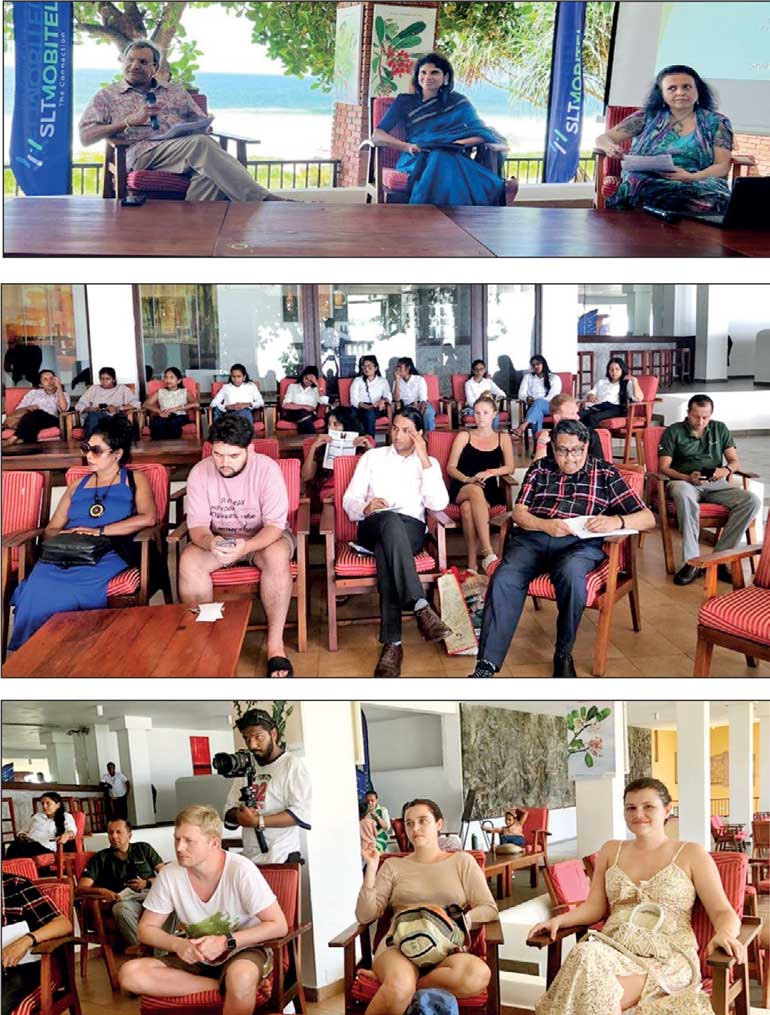Monday Feb 23, 2026
Monday Feb 23, 2026
Wednesday, 24 January 2024 00:00 - - {{hitsCtrl.values.hits}}

The Lakshman Kadirgamar Institute (LKI) hosted a panel discussion ‘Sri Lanka as a Destination: From Antiquity to Modernity’ as part of its outreach activities to promote ‘Cultural Diplomacy’ in Koggala on Saturday (13 January).
Held with the Indian Ocean as the backdrop at the Long Beach Hotel, Koggala, this interactive discussion was organised as part of ‘Rhythms of Paradise’ – the cultural spectacle of ‘Galle Concerto 2024’, with the aim of promoting the southern coastline of Sri Lanka as a tourist destination, and in celebration of Sri Lanka’s timeless cultural and natural heritage. The three-week-long Galle Concerto 2024 commenced with an opening ceremony at the Air Force Base in Koggala on 12 January, and a series of events which included literary explorations, interactive interludes, a drum festival and a musical concert.
Opening the session on ‘Sri Lanka as a Destination: From Antiquity to Modernity’, LKI Executive Director Ambassador Aryasinha said the event underscored the pivotal role of ‘cultural diplomacy’ in positioning Sri Lanka globally and heightened the importance of acknowledging cultural diversity and leveraging it to promote tourism in Sri Lanka. He said it was a potent force which transcends borders and fosters mutual understanding, in a world which is marked by interconnectedness and interdependence. He recalled the writings of Ambassador Dr. Vernon. L.B. Mendis where it was observed, “Few countries in the world could claim to have been so well-known throughout its history as Sri Lanka. From earliest times to modern times, it has enjoyed an international reputation and been admired.” Within the historical frame outlined – from antiquity to modernity, he said the discussion sought to capture the vibrancy and resilience on the one hand, and the unease and restlessness on the other, as Sri Lanka today seeks to carve out a modern day narrative on Sri Lanka – increasingly written by Sri Lankan writers, many living in the diaspora, which presents both a challenge, as well as an opportunity.
University of Colombo Emeritus Professor of Pali and Buddhist Studies Professor Asanga Tilakaratne, who participated in the discussion virtually under the theme ‘Journey Through Antiquity’, painted a vivid picture of ancient Serendib from the Roman times, and how the island nation emerged as a significant entity in the annals of world history. He highlighted writings on relations with India, South East Asia and East Asia in which Sri Lanka was the destination – commencing with the Ramayana, through the arrival of Prince Vijaya, the introduction of Buddhism through Arahant Mahinda and Sanghamitta Theri with the Sri Maha Bodhi sapling. Referring to the fifth century relations with East Asia particularly with China, he noted Fa Hsien being the first known Chinese Buddhist pilgrim, the Polonnaruva period which saw Hindu influence on the island’s culture, art, architecture, while relations particularly with what is today Myanmar and Thailand, was a significant factor starting from around the 11th century continuing till the 15th century.
Renowned Sri Lankan author and novelist Ameena Hussein, who also participated in the discussion virtually, highlighted the documented history of the island by Arab travellers and took the audience on a historical journey with her discourse centred on her recent book ‘Visitors from the Arab World: Ibn Battuta in Sri Lanka’. She expounded upon his role, emphasising the pivotal contribution he made to the historical chronicles of Sri Lanka, thereby underscoring his enduring impact on the island’s historical narrative.
Professor Shihan de Silva Jayasuriya commenced the discussion with an exploration of ‘Untold Stories: Colonial Travellers and Minority Groups.’ With a focus on ancient Ceylon during the Colonial era, she illuminated how Sri Lanka assimilated cultural elements influenced by the Portuguese, Dutch, and British colonial powers, shaping its distinctive identity. Furthermore, she delved into the impact of political, administrative, and legal reforms introduced by the Portuguese, Dutch, and British, shaping the fabric of Sri Lankan governance.
Additionally, she highlighted the contributions of diverse ethnic minorities, including the Malay community, Indian Tamils, and the Sri Lankan-Afro community, which have enriched the cultural tapestry of Sri Lanka. This insightful discourse not only shed light on the historical dynamics of the colonial influence on Sri Lanka but also underscored the resilience and adaptability of the local culture in embracing and incorporating these external influences.
University of London King’s College Professor of Global Literature Professor Ruvani Ranasinha speaking on the theme ‘Sri Lanka as a Destination: Modern Day Framings,’ explored how Sri Lanka is portrayed in contemporary literature. She shed light on various modern authors’ perspectives which focused on themes such as the ethno-political crisis and representations of community, citizenship, minorities, national identity, and gendered social relations in Sri Lanka. Alongside some narrow problematic accounts, she said there was also increasingly a more nuanced portrayal mainly by Sri Lankan diaspora writers of Sri Lanka’s rich ethnic and cultural diversity which included shared experiences of Sri Lanka as a nation, which not only sought to engage Sri Lanka’s recent past as a national experience to be worked through, but also to imagine community in diverse ways and aesthetic forms.
The presentations of this session which was sponsored by SLT-Mobitel was followed by a dynamic exchange of ideas between the panellists and the audience which included tourists visiting Sri Lanka, scholars and university students. In his closing remarks, Ambassador Aryasinha emphasised the importance for a broader and deeper appreciation of Sri Lanka’s multifaceted identity, and the imperative of actively shaping Sri Lanka’s cultural narrative in the global arena in positioning Sri Lanka on the global map, in order to promote tourism.